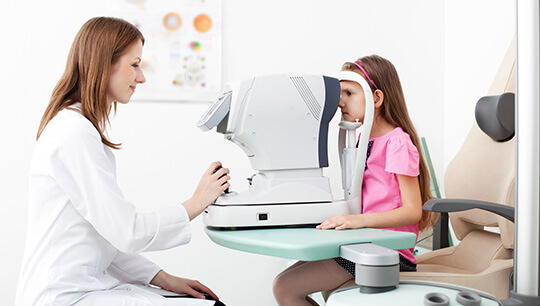Routine physicals and dental appointments are considered necessary for children of all ages. However, eye exams are just as important for safeguarding your child’s health. Did you know that 5-10% of preschoolers and 25% of adolescents have vision complications? Identifying eye problems early on can help avoid damaging and costly problems in the future. It might even help resolve an issue that will cause permanent vision damage if left untreated.
What age should my child have an eye exam?
The American Optometric Association or AOA recommends that infants should have their first comprehensive eye exam at roughly six months of age, then at age 3 and every year after that. As they grow up, exams should be administered at three years of age and then right as they enter first grade (around five to six years old). After this, an exam should be conducted every two years as long as no vision problems are detected. Children who require corrective lenses should be examined annually.
Why are eye exams so important?
Without a comprehensive eye exam, your child will not be properly evaluated for any potential vision problems that could impact their health and ability to perform to the best of their capacity. Eye exams successfully identify these following problems:
- Near-sightedness or far-sightedness
- Lack of “eye teaming” (think of using binoculars as an example)
- Inability to keep or maintain focus
- Lack of peripheral awareness
- Lack of eye/hand coordination
- Astigmatisms
- Cataracts
- Amblyopia, also known as “lazy eye”
- Strabismus, which is a misalignment of the eyes
- And all other potential disorders
It is important to note that most schools require an eye exam before students can enter the classroom. Knowing of any vision problems assists teachers in aiding those students if necessary. As almost 80% of all material taught in classrooms today is delivered visually, it is critical that your child is given every available opportunity to succeed.
What should I expect at my child’s first eye exam?
Your child will undergo a series of visual acuity measurements and close examinations to test and view both eyes singularly and together. The retina, eye muscle movements, pupils, cornea and their movements will all be closely examined using a biomicroscope. If the child is old enough, he or she will be asked to conduct a series of interactive tests such as reading letters back from a wall, or identifying figures from a distance. Unlike other doctor’s visits that can often involve scary and painful needles and other invasive procedures, eye exams are quick, painless and sometimes even fun for the child. Regardless, make sure that your child is in a calm or happy mood before the exam as a fussy, uncooperative child will not be able to perform the necessary interactive portions of the exam.
But my child’s vision seems normal. Do I really have to take her in for a test?
Even if your child’s vision seems absolutely fine, it is still important to schedule the appropriate exams with your local eye doctor. A licensed professional will be able to see prospective problems in your child’s eye in ways you cannot. It is better to err on the side of caution than to wait until something harmless evolves into an enormous problem.




